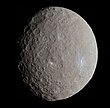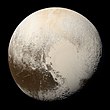(230965) 2004 XA192
Appearance
(Redirected from 2004 XA192)
 | |
| Discovery | |
|---|---|
| Discovered by | Palomar |
| Discovery date | 12 December 2004 |
| Designations | |
| SDO (near or extended)[2] | |
| Orbital characteristics[3] | |
| Epoch 13 January 2016 (JD 2457400.5) | |
| Uncertainty parameter 3 | |
| Observation arc | 9268 days (25.37 yr) |
| Earliest precovery date | 29 August 1989 |
| Aphelion | 58.967 AU (8.8213 Tm) |
| Perihelion | 35.465 AU (5.3055 Tm) |
| 47.216 AU (7.0634 Tm) | |
| Eccentricity | 0.24888 |
| 324.44 yr (118503 d) | |
| 356.376° | |
| 0° 0m 10.936s / day | |
| Inclination | 38.07711° |
| 328.7517° | |
| 132.632° | |
| Earth MOID | 34.588 AU (5.1743 Tm) |
| Jupiter MOID | 30.7418 AU (4.59891 Tm) |
| TJupiter | 4.703 |
| Physical characteristics | |
| Dimensions | 549 km[4] 339+120 −95 km[5] |
| 7.88 h (0.328 d) | |
| 7.88[3] | |
| 0.09 (assumed)[4] 0.26+0.34 −0.15[5] | |
| 19.84[6] | |
| 4.2[3] 4.42±0.63[5] 4.6[4] | |
(230965) 2004 XA192 is a Kuiper-belt object with a diameter of 339+120
−95 km. It has an absolute magnitude of approximately 4.42, and albedo around 26%. It was discovered on 12 December 2004 at Palomar Observatory.
It is currently at 35.8 AU from the Sun, near its perihelion.[7]
References
[edit]- ^ Lowe, Andrew. "(230965) 2004 XA192 Precovery Images". andrew-lowe.ca.
- ^ Marc Buie (23 August 2014). "Orbit Fit and Astrometric record for 230965". SwRI (Space Science Department). Retrieved 14 November 2014.
- ^ a b c "JPL Small-Body Database Browser: 230965 (2004 XA192)" (2011-11-22 last obs; arc: 22.23 years). Retrieved 11 April 2016.
- ^ a b c Brown, Michael E. "How many dwarf planets are there in the outer solar system?". California Institute of Technology. Retrieved 28 April 2019.
- ^ a b c TNOs are Cool: A survey of the trans-Neptunian region. X. Analysis of classical Kuiper belt objects from Herschel* and Spitzer observations p. 18
- ^ 0 & n = 230965 AstDys Summary for (230965) 2004 XA192. Retrieved 31 August 2009
- ^ AstDys Ephmerides for (230965) 2004 XA192, retrieved 31 August 2009
External links
[edit]


